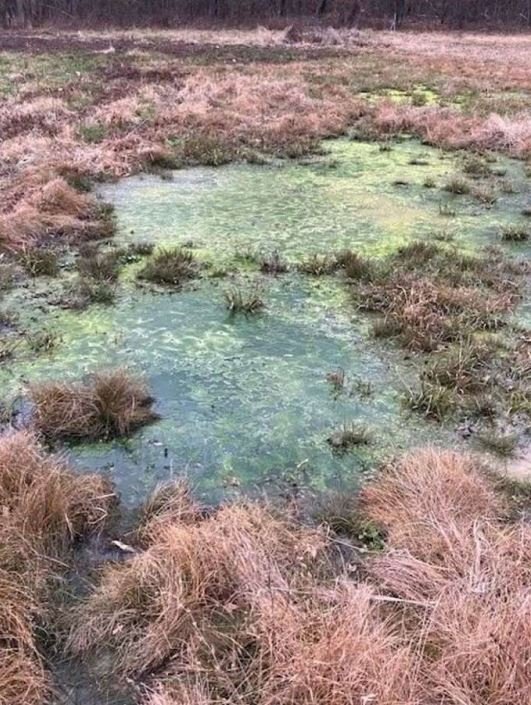State inspectors captured images of algae-filled ponds at the Ridgewater wastewater treatment facility in Mount Juliet, Tennessee, on January 8, 2024.
Environmental organizations are preparing to file a lawsuit against the Wilson County Wastewater Authority in connection with the facility, citing numerous violations of state regulations regarding the discharge of polluted wastewater into local tributaries of the Cumberland River.
The treatment system caters to roughly 89 residences within the Ridge Water Estate and Camelot Cove developments. It processes sewage by filtering it through sand and UV technology before distributing the residual wastewater into a so-called “drip field,” which is designed to disseminate the effluent across a broad area, effectively allowing the soil to filter it naturally.
However, the Ridgewater facility has struggled with oversaturating its drip field for over five years. An intent to sue notice sent by the Southern Environmental Law Center on August 6 indicates that the facility has only utilized a third of its permitted capacity, resulting in a pool that has been reported to be covered in “algae and slime mats,” as observed in a state inspection from March 2021.
Recent inspection reports in April highlighted that wastewater was being diverted through unauthorized trenches, discharging contaminants into Cumberland River tributaries, which violates federal clean water regulations. Samples taken downstream revealed E. coli and other harmful contaminants exceeding Tennessee and Environmental Protection Agency recreational standards.
The notice also warns of active federal lawsuits involving Wilson County (the system’s owner), Adenus Operations, LLC (the operator), the EPA, and the Tennessee Department of Environment.
In its defense, the Wastewater Department claims the trench in question was a pre-existing storm drain that has been recently cleared, attributing the high E. coli levels to other local sources. Adenus has not responded to media requests for comments.
The legal action seeks an injunction to stop ongoing violations and proposes a civil penalty that could reach as much as $68,445 daily for each infraction. The Tennessee Scenic Rivers Association and the Sierra Club assert that the facility has been unlawfully discharging wastewater into tributaries since August 2020.
State Regulatory Records Highlight Continuing Issues
The Tennessee Department of Environment and Conservation (TDEC) first began issuing permits for “dispersed drip dispersion systems,” like the one at Ridgewater, back in the 1990s. The lack of dependence on existing sewage infrastructure has made this type of system appealing for rural areas, as noted in the legal notice.
Currently, Tennessee is home to around 374 permitted drip distribution systems. A 2024 TDEC survey revealed that over half of the 360 active sites were not in compliance with their permits. One prevalent issue has been the overload of soil with wastewater, leading to contamination of adjacent lands and water bodies.
The Ridgewater site received its wastewater system permit in March 2018, which forbids any discharge into surface water and mandates ongoing maintenance, sampling, and reporting.
While plans for the Ridgewater site indicate a six-acre drip field, state inspections have shown that only about two acres are currently in use.
Between March 2021 and May 2025, TDEC conducted several inspections that identified numerous significant issues: problematic ponds, sand filter failures, extensive algae growth, and a lack of fencing around the area, all in close proximity to homes.
Regulators issued two notices of violation to the Wilson County Wastewater Authority and Adenus in 2021 and 2024. In response, the wastewater authorities proposed modifications to the pond filters and drip field system to mitigate the ongoing issues. They also claimed the drip field was supposed to cover 3.5 acres, while original documents indicated over six acres.
A recent TDEC inspection on May 2 uncovered new trenches filled with water, bubbling liquid, and a “moderate sulfur smell.” The inspector noted, however, that it was “unclear whether the water flowing through the channel is being discharged from adjacent lowlands or from sand filters.”
Chris Leehoover, the executive director of the Wilson County Wastewater Department, asserted that the trench was actually a storm drain, cleaned to redirect stormwater from the area. He shared a photo of what appeared to be a dry trench dated August 12.
Furthermore, he claimed that E. coli levels recorded on April 23 were within the state limits, despite higher readings from tributary samples taken the day prior.
The wastewater authorities are committed to collecting necessary samples from the discharge before directing it into the drip field.
“So, the elevated E. coli levels could possibly stem from other local sources,” Leehoover noted.
Reports concerning foul odors, algae, and sludge in nearby river tributaries have prompted similar legal actions, mainly from environmental organizations pushing for stronger oversight.
A lawsuit in Dixon County involving the Harpeth Conservancy was resolved in September 2023, resulting in a requirement for utility companies to clean up Trace Creek and amend operating procedures to prevent future pollution.
In November 2024, the Tennessee Riverbank brought a lawsuit against the town authorities of Selina, alleging that sewage overflow had contaminated Lake Cordel Hull and several rivers, violating the Clean Water Act. A settlement was reached in July, which mandated improvements to the wastewater system and a civil penalty of $79,650 according to court documents.







